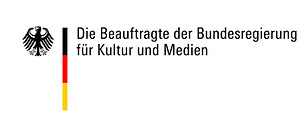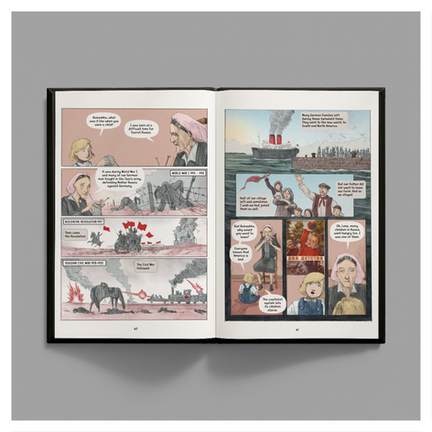
MAY THE UNIVERSE BE YOUR HOME!
Growing up German in Kazakhstan
A Graphic Memoir
by Lena Wolf, Christoph Heuer, Ester Salguero
Lena Wolf grew up believing that all Germans came from Kazakhstan—until her grandmother, Emilia, began sharing bedtime stories that were anything but comforting. They were stories of deportation, hunger, and survival—the buried truth behind her family’s exile under Stalin.
Her ancestors had been among the Germans invited by Catherine the Great in the 18th century to settle in the Russian Empire, farming its land for more than seven generations. But everything changed in 1941, when Nazi Germany invaded the Soviet Union. Overnight, being German became a crime. Over a million ethnic Germans, including Lena’s family from the village of Blumenfeld in Ukraine, were labelled “enemies of the people,” accused of espionage, and deported to remote regions of Siberia and Kazakhstan. As “special settlers,” they endured years of forced labour and hunger while their language, faith, and culture were systematically erased.
In May The Universe Be Your Home!, Lena sets out to recover what was lost—to understand how to love a country that erased her family’s past. Through the interwoven voices of three generations—hers, her grandmother Emilia’s, and her mother Angelina’s—the graphic memoir traces a journey through silence, memory, and belonging.
It is a story about what remains when home is taken away—and how the search for identity can become an act of remembrance.
A Powerful and Personal Journey into a Forgotten History
I initially bought this book to share with my grandchildren to learn the history of our ancestors who stayed in Russia and were forcibly deported by Stalin in August 1941 to Siberia and Kazakhstan. What I didn’t expect was how deeply it would affect me. I couldn’t put it down. And now, I’m eagerly awaiting the second volume!
Cynthia ⭐⭐⭐⭐⭐
Eye-Opening Story, Impactful Graphic Novel
I loved this beautifully crafted graphic novel. I had no idea about the scale of atrocities committed against ethnic minorities in the Soviet Russia and Soviet Union in general. Stories like the one told by Lena Wolf should be taught at school in order for next generations to not commit the same crimes and strive for a just, equal and peaceful society.
Kristina ⭐⭐⭐⭐⭐
A Captivating and Inspiring Read
This book is an absolute gem! Lena’s unique story, intertwined with her rich family history, held me captive from the first page to the last—I couldn’t put it down and finished it in one sitting. It’s a beautifully told narrative that not only inspires but also serves as an incredible bridge for connecting younger generations to our shared history. By the end, I felt a profound connection to Lena’s grandmother, as though I had been given the privilege of meeting her personally.
Anna ⭐⭐⭐⭐⭐














